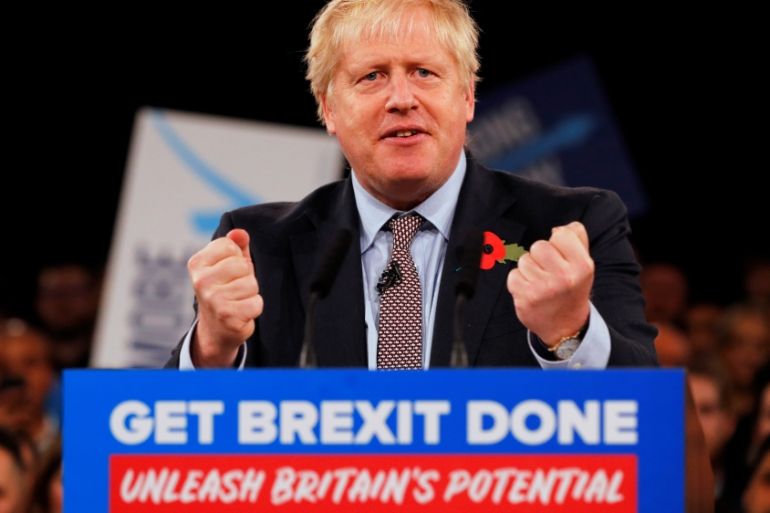Brexit and its vapid verbalisations
The leave side of the debate is trying to contain Brexit’s irreducible complexity in increasingly-inane slogans.

The never-ending Brexit saga has the world hooked, not on its complexities, but on the spectacle it is turning out to be. British humour has been at its sardonic best in capturing that complexity with Brexit described as “the political equivalent of reversing a vasectomy”. This, however, does not deter British Prime Minister Boris Johnson from ranting on about “getting Brexit done”. One indicator of the widening chasm between the complex realities and difficulties of Brexit and its actual realisation is the numerous slogans that have been coined, mostly by the “leave” side of the Brexit divide. What these simplistic slogans reveal is their increasing insanity as they seek to contain complex ideas and political processes in the short space of a few verbal vacuities. Here is a sample some of them:
‘Let’s take back control’
This is a leave favourite, but leaves unanswered the question – control of what? Someone like Johnson, never known for his grasp of details, keeps repetitiously suggesting control of borders, money and laws. The slogan seems to have some vague connection to an assertion of rather severe sovereignty of the nation-state vis-a-vis the much-hated supranational European Union. The slogan is certainly not about the sovereignty of the Parliament of the United Kingdom to make laws unfettered by the European one. Johnson has berated Parliament and in typical populist fashion has pitched the impending December elections in terms of “the people” against Parliament.
Keep reading
list of 4 itemsNorthern Ireland agreement could end deadlock, restore government
Forced to become British: How Brexit created a new European diaspora
Number of Britons regretting Brexit hits new record high: Survey
‘Get Brexit done’
This is another gem that Johnson keeps mouthing and one which was taken up by the Conservative Party conference held in Manchester in late September, with the British media reporting how the words were plastered over nearly every surface in the city. It also has dangers as a threat. In a viral video, Labour MP Karl Turner confronts Johnson’s powerful adviser and the dark genius behind the Brexit process, Dominic Cummings. As the visibly agitated Labour MP complains about PM Johnson’s coarse rhetoric and the death threats that he himself has received, an unruffled Cummings calmly tells him to “get Brexit done”. The implication is that that is the best way for the death threats to go away.
‘Get on with it/Brex(it)’
An instance of how the complexities of a political process can be reduced to a few words to then be mouthed by people up and down the country to egg the process on. It is the low-brow, political equivalent of Magnus Magnusson, the stern quiz master of the high-brow BBC quiz show Mastermind, saying the words “I’ve started so I’ll finish”, each time a contestant’s allotted time had run out and he had just begun the last question.
‘We want our country back’
This one would be the political equivalent of the angry and assertive customer demanding his/her money back after a dissatisfactory subscription or purchase. The tone may have been set by Margaret Thatcher back in 1984 when she drove a hard bargain to successfully negotiate the British Rebate to the country’s substantial contribution to the EU budget. It could also be about saving 350 million pounds a week by leaving the EU, a false figure, famously painted on a red bus to make the message travel. The slogan may also be about getting the country out of the clutches of the byzantine EU bureaucracy in Brussels and the “hordes” of immigrants that it seems to encourage into, specifically, England, (note not Britain or the UK) thereby despoiling that green and pleasant land.
‘No deal, No problem’
This slogan is perhaps the one most about throwing caution to the winds and jumping off the famous white cliffs of Dover, straight into the English Channel. Politically, it would be closest to Nigel Farage’s single-issue Brexit party that wants a proper Brexit, whatever that means. Obviously, those who utter this slogan care not to heed the warnings of the government-commissioned report, Operation Yellowhammer, that has talked about the possibility of food and medicine shortages and more ominously, civil unrest on British streets in the event of a no-deal Brexit.
‘No deal is better than a bad deal’
This never made it to a political slogan in the sense in which one becomes a rallying cry. The words were contained in a speech given by then-Prime Minister Theresa May in January 2017. They were preceded by an earlier similar statement when May rather robotically proclaimed “Brexit is Brexit”. Together, these statements would have warmed many Eurosceptic hearts. A suggestion such as “no deal is better than a bad deal” can be held responsible for making a no-deal into a distinct default possibility, from an earlier more remote possibility, and thereby paving the way for the previous slogan: “No deal, no problem.”
Most of the slogans have come from the leave side which has perhaps been more successful in rallying people in comparison to remain. The opposition leader, Jeremy Corbyn, no enthusiastic remainer himself, has explained his party position with a far more circuitous verbosity. Labour’s position is one of renegotiating another deal, then putting this to the people in yet another referendum in the next three months, where remaining in the EU would also be an option. Compared with the simplistic and succinct quality of Brexit slogans, this sounds almost like rocket science. There can be nothing like a slogan to kill the nuances of political argument. Who better to turn to than the English genius of George Orwell and the slogan that he coined: “Four legs good, two legs bad.”
The views expressed in this article are the author’s own and do not necessarily reflect Al Jazeera’s editorial stance.
